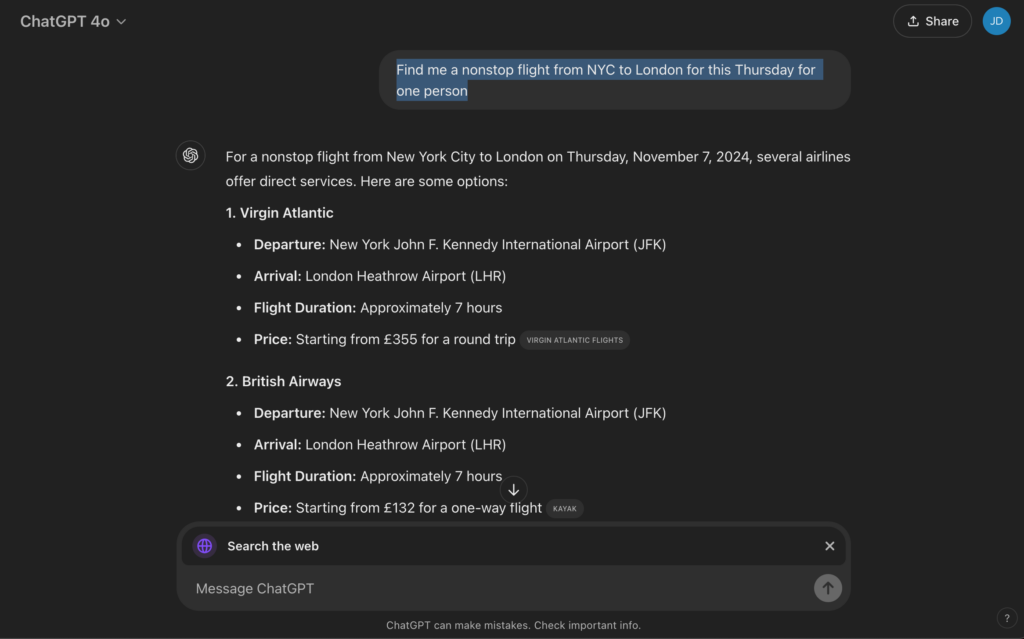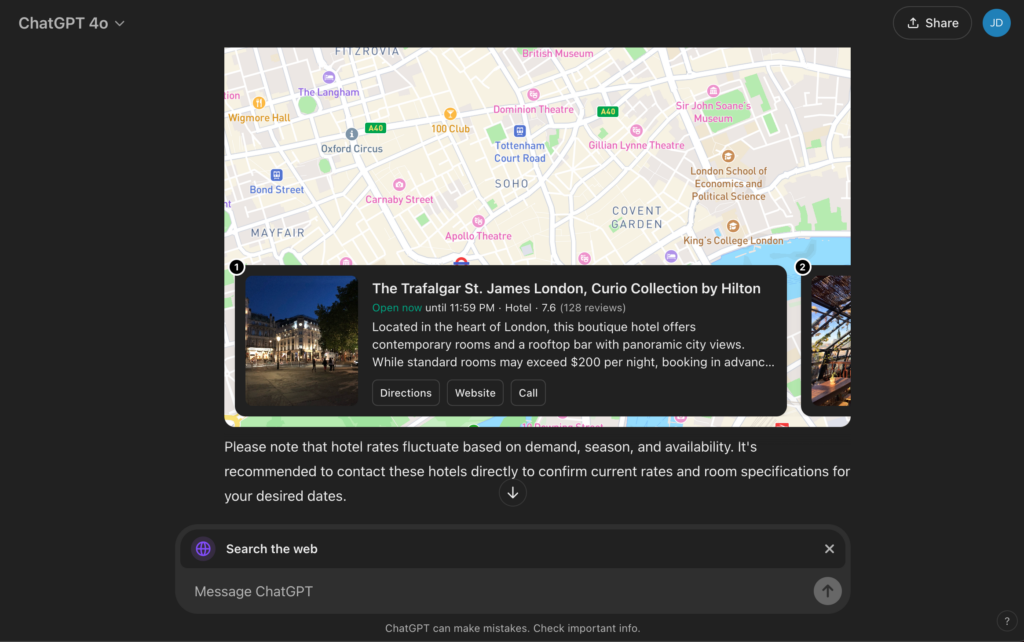[ad_1]
Skift Take
ChatGPT is now a better place to start making travel plans, but finalizing those plans still needs to happen the traditional way.
OpenAI made arguably its biggest update yet to ChatGPT on Thursday.
Users can now ask ChatGPT to the search the web, combining real-time results with AI-generated content. This has obvious implications for travel and addresses early criticism of ChatGPT â that it has been able to answer general questions about a destination, but not share real-time information like upcoming events.
OpenAI says it plans to continue strengthening its search engine with a particular focus on travel.
This new version of ChatGPT most closely resembles the AI search engine on Bing, which Microsoft launched in early 2023. Like Bing, the new search engine by OpenAI is more useful in some ways because it cites links. Also like Bing, the search results on the new ChatGPT search engine can be inaccurate.Â
Skift tested how the new web search function on ChatGPT works for flights, hotels, activities and attractions, and restaurants.
Flights
The prompt: âFind me a nonstop flight from NYC to London for this Thursday for one person.â
The response:
- ChatGPT shared options from Virgin Atlantic, British Airways, and American Airlines. They came with links to the Virgin Atlantic website, Kayak, and Skyscanner, respectively.
- After clicking each of the links, the user is required to start a fresh search on the respective websites.
- The prices that the AI listed were way off. ChatGPT said the Virgin Atlantic flight, for example, would be $460 for a roundtrip. It was actually $757 for one way.

Hotels
The prompt: âWhat are some options for a hotel under $200/per night in a trendy neighborhood in London for next weekend? The room should have a king bed and the hotel should have rooftop access.â
The response:
- âFinding a hotel in London with a king-sized bed, rooftop access, and a rate under $200 per night can be challenging, especially in trendy neighborhoods. However, here are a couple of options that closely match your criteria.â
- There were two hotel options and links, along with pins placed on an interactive map with a similar user experience as Google Maps or Tripadvisor.
- Each link brings the user to the respective hotel website and requires the user to start a new search there. The price for one hotel was much more expensive than $200, and the other hotel was sold out for the weekend requested.
- A quick regular search on Kayak shows dozens of options that fit the bill.


Activities and Attractions
The prompt: âWhat are some artsy events or places to visit, off the beaten path, for next weekend in London?â
The response:
- ChatGPT included two lists of options, allowing the user to choose the preferred response. Each suggestion included a reference link and photo.
- The lists included only non-mainstream options, which aligns with the prompt.
- Most of the event suggestions were accurate for the proper weekend, pulled from recent articles by publications including Time Out. A similar prior test for Bing showed that many suggestions were outdated because the AI cited old articles.
- One suggestion was for an art show that no longer exists, pulled from an article written in 2016.
- Overall, it was a useful way to find non-mainstream venues and events.
Restaurants
The prompt: âFind some trendy fusion restaurants with good reviews in London and include a map.â
The response:
- ChatGPT provided three restaurants with links to their websites, along with pins placed on an interactive map with a similar user experience as Google Maps or Tripadvisor.
- The suggestions also included opening hours, price ranges, review ratings, and short restaurant descriptions. The prices and reviews do not match Google, and itâs unclear where they came from. The opening hours are not always accurate.
- Thereâs also a link to Google Maps for directions and Google Voice to make a phone call.
- Overall, it was a useful way to find non-mainstream venues and events.
Conclusion
This update was a big step forward for ChatGPT, combining the generative AI tech with real-time information.
The dream is that all of those travel suggestions would be accurate, of course, and that they would be bookable through the same ChatGPT platform. And the bigger dream would be that every leg of the journey would be connected with data, allowing travelers to seamlessly manage their trips through the same platform, as well as use it during and after the trip.
That dream is still far away. On top of limitations with the AI, it’s also because the travel industry is far behind the important step of standardizing and sharing data.
ChatGPT is now a better place to start making travel plans, but finalizing those plans still needs to happen the traditional way.
[ad_2]
Source link

